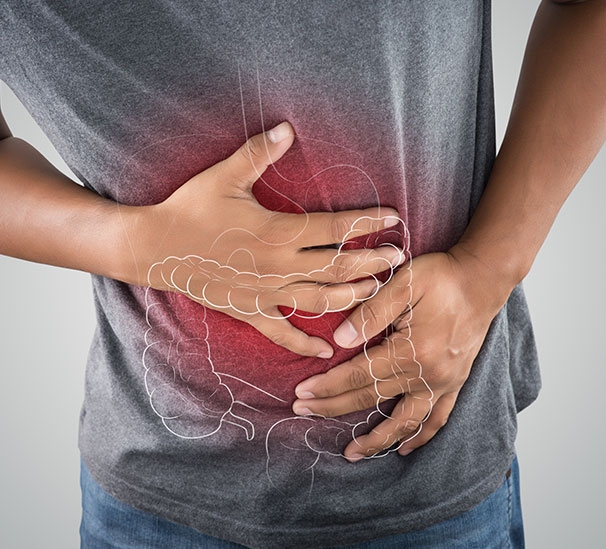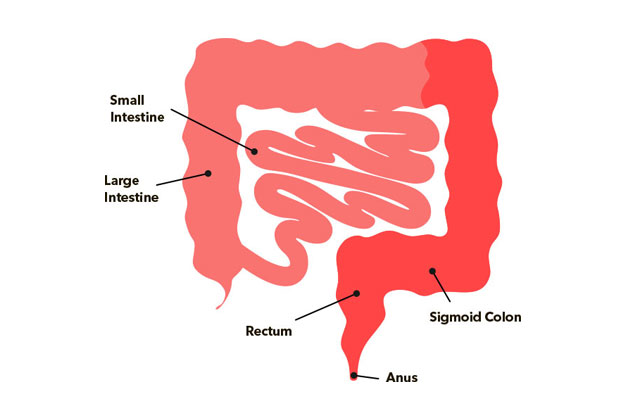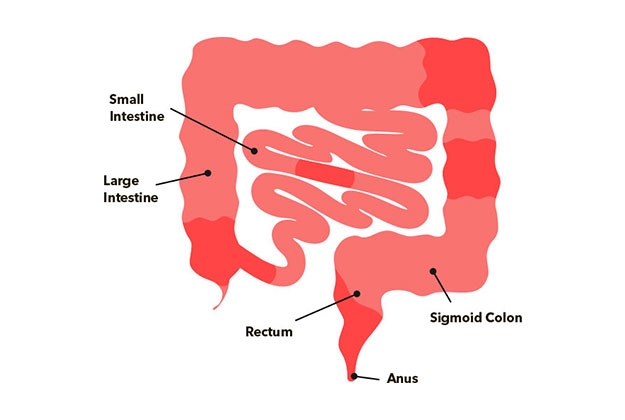Inflammatory bowel disease (or IBD) is a group of chronic idiopathic, relapsing and remitting disorders that cause inflammation of the gastrointestinal tract.1–3Although it was traditionally regarded as a disease of westernised nations, IBD is becoming a global disease at the turn of the 21st century.2 It impacts every aspect of the affected individual's life4 and accounts for substantial costs to the health care system and society.4
Over 3.5 million people affected in the Western world

The prevalence of IBD in the Western world is up to 0.5% of the general population2
- Ng SC, et al. Lancet. 2018;390(10114):2769–2778.
- Kaplan, GG. Nat Rev Gastroenterol Hepatol. 2015;12:720–727.

The types of IBD and risk factors
There are two main types of IBD: ulcerative colitis (UC) and Crohn’s disease (CD).5 Ulcerative colitis is a predominantly mucosal disease, its fundamental symptoms is rectal bleeding, and involves the rectum and can affect part of the colon or the entire colon in a continuous pattern.6 In contrast, Crohn’s disease can affect any part of the gastro-intestinal track (from mouth to rectum), although its location more common is the ileum.
Multifactorial Disease
Imbalance of Intestinal Microbiota Causitive & aggravating factors

- Khor B, et al. Nature. 2011;474(7351):307–317.
- Russell R. Postgrad Med J. 2001;77(904):82–88.
- Bjarnason I, et al. Pharmacol Ther. 1994;62(1–2):145–157.
- Mokhtarifar A, et al. Middle East J Dig Dis. 2013;5(2):93–97.
- Ni J, et al. Nat Rev Gastroenterol Hepatol. 2017;14(10):573–584.
- Ananthakrishnan AN, et al. Nat Rev Gastroenterol Hepatol. 2018;15(1):39–49
Although, ulcerative colitis and Crohn’s disease differ in location and depth of inflammation, they share similar symptoms.7 In general, the symptoms depend on the segment of the intestinal tract involved.8 Symptoms related to inflammatory damage in the gastrointestinal tract include diarrhoea (characterised by stools with mucus or blood, nocturnal diarrhoea or incontinence), constipation, pain or rectal bleeding with bowel movement, bowel movement urgency, tenesmus, abdominal cramps and pain, nausea and vomiting.8,9 If you have IBD you are at higher risk of also having iron deficiency and iron deficiency anaemia. Indeed, anaemia is the most common non-intestinal symptom of IBD10.
Ulcerative Colitis1,2
- Rectal pain, with or without diarrhoea
- Bloody diarrhoea
- Rectal bleeding
- Faecal incontinence
- Urgency / tenesmus
- Nocturnal defecation
- Abdominal cramps or pain
- Increased frequency of bowel movements


Crohn’s Disease3
- Abdominal pain often found in the lower right quadrant
- Chronic diarrhoea that can alternate with episodes of constipation
- Rectal bleeding or bloody diarrhoea
- Nausea / vomiting
- Ungaro R, et al. Lancet. 2017;389(10080):1756–1770.
- Magro F, et al. J Crohns Colitis. 2017;11(6):649–670.
- Torres J, et al. Lancet. 2017;389(10080):1741–1755.
Why are you at risk?
If you have IBD of any kind, you are at risk of iron deficiency. Learn more about the risk of IDA.
- WGO Global Guidelines. 2015
- Ng SC et al. Lancet. 2017;390:2769–2778
- Wilhelm SM and Bryan L. Clinical Pharmacist. 2017;Vol 9(3):online. DOI: 10.1211/CP.2017.20202316
- Burisch J et al. J Crohns Colitis. 2013;7(4):322–337
- Kaser A et al. Annu Rev Immunol. 2010;28:573–621
- Guan Q. J Immunol Res. 2019;2019:7247238
- Kim DH and Cheon JH. Immune Network. 2017;17(1):25–40
- WGO Global Guidelines. 2015
- Rowe WA. Inflammatory Bowel Disease: Practice Essentials, Background, Pathophysiology. Medscape. 2017
- Stein J, Hartmann F, Dignass AU. Diagnosis and management of iron deficiency anemia in patients with IBD. Nat Rev Gastroenterol Hepatol. 2010;7(11):599-610. doi:10.1038/nrgastro.2010.151.
إذا كنت مصابًا بداء الأمعاء الالتهابي (IBD) من أي نوع، فأنت معرض لخطر نقص الحديد. حيث يعاني ما يقرب من 36%–76% من المصابين بداء الأمعاء الالتهابي من فقر الدم الناجم عن نقص الحديد. تعرف على المزيد حول مخاطر فقر الدم الناجم عن نقص الحديد (IDA).
يمكن أن تؤثر أعراض نقص الحديد على العديد من مناطق جسمك. وقد تعاني من واحد أو أكثر من هذه الأعراض في نفس الوقت. اكتشف كل علامات نقص الحديد.
إذا تم تشخيص إصابتك بداء الأمعاء الالتهابي، فمن المحتمل أن يكون لديك مواعيد متابعة منتظمة مع طبيبك. إذا كنت تشعر بالإجهاد أو لديك أي علامات أخرى لنقص الحديد مثل الشحوب، أو الضعف، أو تسارع ضربات القلب، فقد ترغب في استشارة طبيبك حول هذه الأعراض ونقص الحديد. من المفيد التفكير في المعلومات التي قد يحتاج الطبيب إليها لمعرفة السبب وراء هذه الأعراض. قد يقوم طبيبك بإجراء فحوصات الدم للتحقق من حالة الحديد لديك قبل اقتراح العلاج لتحسين حالة الحديد لديك.
بمجرد فحص طبيبك لمستويات الحديد لديك، يمكنه تحديد العلاج الأفضل لك. وسيعتمد هذا على مستوى نقص الحديد لديك، ويمكن أن يكون بمثابة نصيحة بشأن كيفية الحصول على المزيد من عنصر الحديد في نظامك الغذائي و/أو توصيات للأدوية التي يمكنك تناولها لتحسين مستويات الحديد لديك. ويمكن العثور على مزيد من المعلومات بشأن خيارات العلاج المختلفة وكيفية الحصول على أكبر قدر من عنصر الحديد من نظامك الغذائي باتباع هذا الرابط.
إذا كنت مصابًا بداء الأمعاء الالتهابي (IBD) من أي نوع، فأنت معرض لخطر نقص الحديد. حيث يعاني ما يقرب من 36%–76% من المصابين بداء الأمعاء الالتهابي من فقر الدم الناجم عن نقص الحديد. تعرف على المزيد حول مخاطر فقر الدم الناجم عن نقص الحديد (IDA).
يمكن أن تؤثر أعراض نقص الحديد على العديد من مناطق جسمك. وقد تعاني من واحد أو أكثر من هذه الأعراض في نفس الوقت. اكتشف كل علامات نقص الحديد.
إذا تم تشخيص إصابتك بداء الأمعاء الالتهابي، فمن المحتمل أن يكون لديك مواعيد متابعة منتظمة مع طبيبك. إذا كنت تشعر بالإجهاد أو لديك أي علامات أخرى لنقص الحديد مثل الشحوب، أو الضعف، أو تسارع ضربات القلب، فقد ترغب في استشارة طبيبك حول هذه الأعراض ونقص الحديد. من المفيد التفكير في المعلومات التي قد يحتاج الطبيب إليها لمعرفة السبب وراء هذه الأعراض. قد يقوم طبيبك بإجراء فحوصات الدم للتحقق من حالة الحديد لديك قبل اقتراح العلاج لتحسين حالة الحديد لديك.
بمجرد فحص طبيبك لمستويات الحديد لديك، يمكنه تحديد العلاج الأفضل لك. وسيعتمد هذا على مستوى نقص الحديد لديك، ويمكن أن يكون بمثابة نصيحة بشأن كيفية الحصول على المزيد من عنصر الحديد في نظامك الغذائي و/أو توصيات للأدوية التي يمكنك تناولها لتحسين مستويات الحديد لديك. ويمكن العثور على مزيد من المعلومات بشأن خيارات العلاج المختلفة وكيفية الحصول على أكبر قدر من عنصر الحديد من نظامك الغذائي باتباع هذا الرابط.



